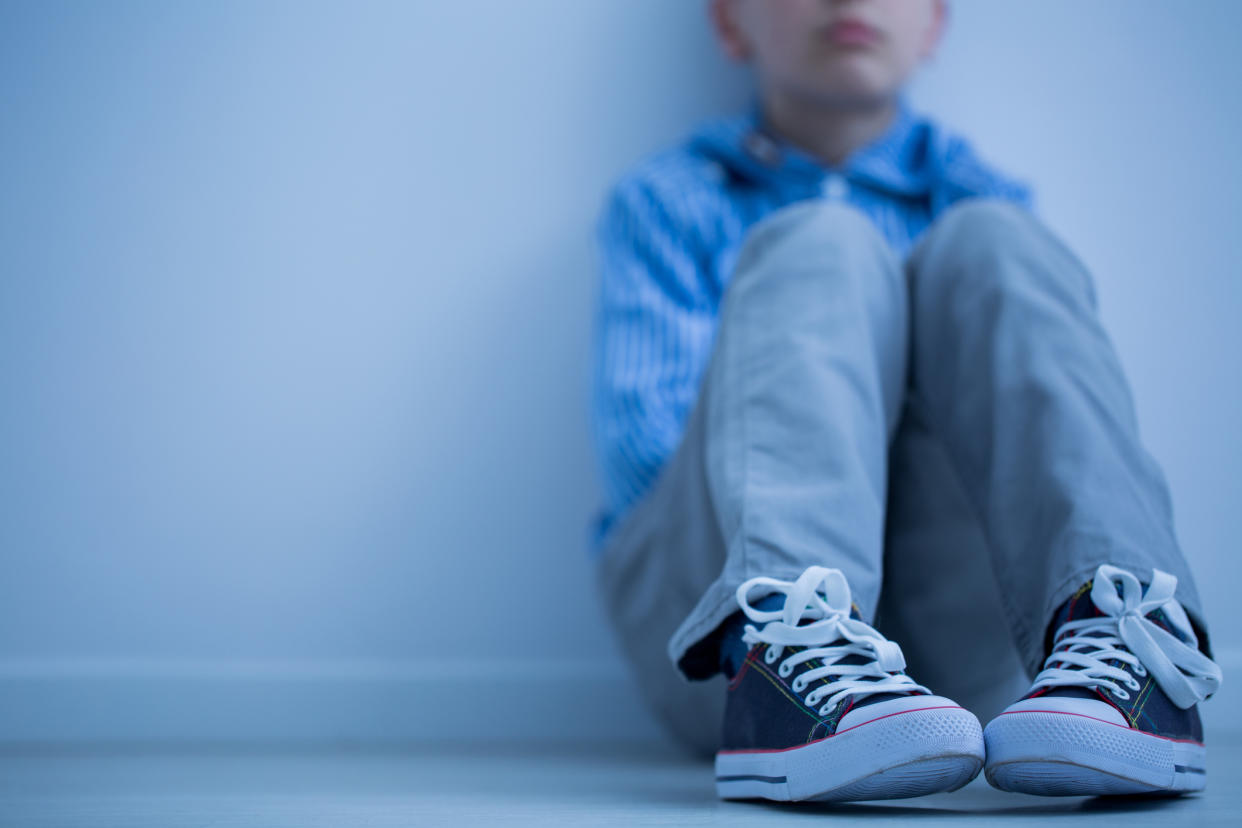Most parents worried about kids' mental health: How to spot if your child's struggling

Almost three-quarters of parents are concerned about their children's mental health, according to research from last year – an issue being highlighted during Children's Mental Health Week (6-13 February 2023).
The survey of more than 2,000 parents, commissioned by BBC Bitesize and Netmums, found that 74% of parents are concerned about their child’s mental health and nearly half (44%) said that their child had already experienced mental health challenges.
A second study by the NHS, found that, in 2022, 18% of children aged seven to 16 and 22% of young people aged 17-24 had a probable mental health issue.
So, how can parents spot if their child is struggling? If your child is going through the 'terrible teens', how can you spot the difference between 'normal' moodiness and something more serious?
Watch: Social media break 'improves mental health'
Read more: How to spot anxiety in your child – and how to help them
“Most adults think of their childhood as the happiest time of their life. But we forget too quickly that being a child can be stressful, says Kirsty Lilley, mental health expert at CABA.
“From peer pressure to academic expectations, there are many aspects of modern life that can lead a child or teenager to feel stressed, anxious and worried, which can lead to depression if ignored.
“It will come as no surprise that exams, school and homework are often common triggers. But there are also other causes to be mindful of.
"Peer pressure, world events, family changes and even a lack of body confidence can also lead to a child feeling stressed or depressed.”
Signs and symptoms that could indicate a mental health struggle
Increased alone-time
“Look out for a child that isolates themselves from friends and family, and a constant low mood and lack of energy that may manifest in struggling to do anything other than the minimum they have to do every day,” explains Dr Hayley van Zwanenberg, child and adolescent psychiatrist based at the Priory’s Wellbeing Centre in Oxford.
Lack of motivation
Dr van Zwanenberg also recommends parents look out for their child’s dwindling motivation such as abandoning extra-curricular activities and hobbies. “And negative thoughts like: ‘I’m a boring person and rubbish at everything’.”
Changes in behaviour and eating habits
According to Dr van Zwanenberg some depressed children may also show signs of self-harm, changes in appetite (either not hungry or comfort-eating) and poor concentration, leading to a decrease in academic performance.
“Thinking, ‘I’m rubbish, I deserve to suffer, I cannot take this anymore’, or, ‘I’m going to let everyone down’, is common,” she continues.
Read more: 'Anxiety' chosen by children as word of the year 2021
Sleeping more – or less
“Changes in sleep patterns can also be an indicator your child is struggling with their mental health,” Dr van Zwanenberg explains.
Gut instinct
Mental health counsellor, Lynn Crilly advises parents to listen to their gut if they think something is wrong with their child. “There really is no substitute for intuition,” she explains. “If you feel that there is something ‘amiss’ with a young person you know then there is likely to be a good reason for that instinct. We have gut feelings for a purpose.”
Losing interest in their favourite things
“Often the biggest sign to look out for is children losing interest in activities they used to love,” explains Lynn Crilly.
“It could be a sport, a TV programme they have always enjoyed, playing a musical instrument or even hanging out with friends, this extremely common sign is usually one of the first to appear and should be approached with your loved one, calmly, caringly and most importantly swiftly.”
Other signs and symptoms to watch out for include:
Doing things more slowly or even speak more slowly.
Displaying irrational and even delusional thoughts.
Breaking down in tears for seemingly no reason or in unexpected situations.
Constantly have self-doubt and lack in self confidence

How to talk to your children about their mental health
Encourage them to open up
“If you suspect your child is under a lot of pressure or suffering from stress, it’s important to take the time to listen and spend more time than usual with them,” says Lilley.
“Make yourself available for fun activities or just being in the same room as them. Ask them about their day and show an interest in things that are important to them. But try to avoid forcing them to talk about their worries – they’ll open up when they feel comfortable talking about it.”
And asking them to open up in a way they feel happy with is key. “They could text their thoughts to you, write them down, or talk to you about them when feeling calm,” says Dr van Zwanenberg.
Ask them again
The simple act of asking again how they are feeling shows a genuine willingness to talk and listen. “Our research shows that asking ‘Are you ok?’ is often not enough,” explains Jo Loughran, director of Time to Change. “Asking twice is a simple, effective way to show that you’re asking for real and ready to talk and listen.”
Talk side-by-side, rather than face-to-face
“Talking when shopping, cooking or driving can take the pressure off – you don’t have to have a formal sit-down conversation,” suggests Jo Loughran.
Talk about your own mental health
Open up about your own mental health issues and battles. “Being open about your own mental health shows your child it’s ok to be open too,” Jo Loughran says.
Listen to them
If your child starts talking to you about how they are feeling, make an effort to really listen to them without being overbearing in your concern. “If a parent is worried about a young person, it’s best to sit down calmly with them and explain they are worried, as they do not seem themselves,” says Dr van Zwanenberg.
Ask them what might help
Often, the most helpful thing you can do is ask your child what they think might help them feel better, suggests Dr van Zwanenberg. “Ask them how they would like you to support them,” she says. “It might be they just want hugs, they want distraction such as watching a film with you or not to be left alone at night-time. They might find it helpful to have useful mindfulness apps, such as Headspace.”
Show them the bigger picture
According to Dr van Zwanenbert it is important to contextualise the issue for them, as they might not understand their feelings for what they really are, or feel like they are going ‘mad’ because they don’t have any background knowledge of depression.
“If your child is struggling, calmly explain to them they might be depressed, and that the issue is treatable, but that you understand it is a horrible place to be when you are suffering with it,” she says.
“Reassure them with statistics, such as the fact that one in 10 young people have a diagnosable mental illness at any one time, and depression is very common,” Dr van Zwanenberg continues.

Try to stay calm
Dr van Zwanenberg says the most important thing you can do as a parent is keep your cool. “If you need to discuss what they tell you with another family member or friend for your own support, ensure the young person does not feel their confidence is being broken,” she says.
Try the distraction method
If your child is suffering intense stress, it could help to distract and divert. “There are things you as a parent can do to help their emotions change quickly,” Dr van Zwanenberg says.
She suggests watching a scary film together, reading a funny book, watching humorous clips on the internet or looking at old photos of yourself or them as a baby.
Encourage your child to ‘stop their thought train and get off it’
Dr van Zwanenberg suggests encouraging children to build a brick wall, metaphorically, between themselves and their stressful thoughts. “Urge them not to think about their exam worries except for short periods, say 10 minutes morning and night. (This is not suggesting they don’t revise, but that they block out the worry)” she says.
“Get your child to think of a relaxing memory as a safe place to go to in their head,” she continues. “Ask them to describe it to you in detail, including the sounds, smells, lights, textures, the conversations, the emotions they remember. This can help them relax and distract them from their worries, and, with practice, they can take themselves back there in their head at times of stress.
Seek help early on
“The most important thing is seeking professional help for your child,” advises Dr van Zwanenbert. “Depression is a very difficult illness that causes risks to the young person, but it is treatable, and the earlier treatment is accessed, the better.”
The NHS has some further advice on helping children with mental health concerns.
This article was first published in May 2022 and has been updated


